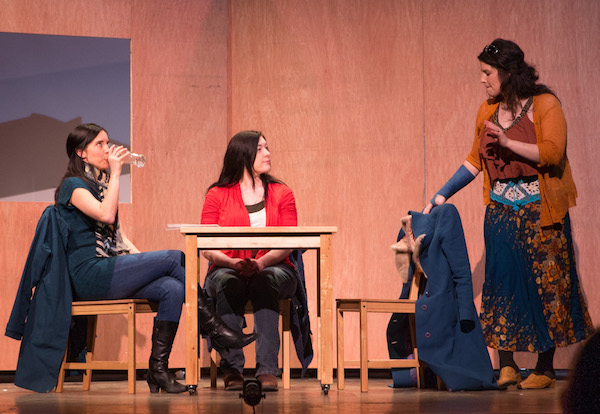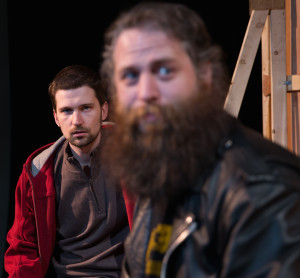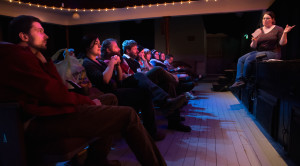
Yet, even without a tidy resolution, where his characters leave the play leaves its audience satisfied that he has illuminated everything in a thoughtful, valuable, and often, very hilarious, way.
The Highland Arts Theatre’s current production of Zadie’s Shoes serves Pettle’s script very well with a talented, empathic cast under some insightful and clever staging by director Sarah Blanchard.

Ruth, before she leaves town to deal with her illness, needs to make peace with her sisters: Beth, an ultra-competitive curler who has superstitiously enforced a no-sex rule on her neurotic husband, Sean; and Lily, a self-absorbed spiritual fad follower who now finds herself, or perhaps, her “self”, unexpectedly preggers.
Like Benjamin and his gambling, all of these characters are making risky wagers with life choices: Beth and a quixotic pursuit of championship, Lily and the placebo rewards of exotic beliefs, and Ruth and the dubious promise of alternative medical treatments.
Again, Pettle draws no easy conclusions and takes his characters to the darker places of not whether or not these choices pan out or not, but, even if they do, how they corrode the bonds of faith, hope, and love between his characters.
Rory Andrews first hit the local stage in the Bandshell Players production of King Lear last October and he makes a sympathetic Benjamin, an impressive feat for an easily unbearable character (“Uh-oh”, said the lady sitting next to me when Andrews picked up Ruth’s envelope of plane ticket money). While he perfectly captured Benjamin’s desperation at the situation he placed himself in, Andrews might have a few more colours to his performance allowing the audience to see the man Ruth obviously feels deep love for.
As Ruth, another wiser commentator described Amber Tapley’s performance as “luminous”, a word I can’t improve on. In a cast of characters spinning out of control, Tapley’s performance gave the play its moral and emotional centre. Her Ruth had an inner strength and intelligence and sense of humour that had the audience rooting for her.
Her sisters were equally well played by Jill Taylor (Beth) and Rachael Rossiter (Lily). Taylor was a taut chord of anxiety and Rossiter had a blousy charm (kind of like an apprentice Edina from Absolutely Fabulous). Despite the differences in personality, the three women were completely believable as sisters (It also worked that Tapley and Rossiter physically resembled each other and Taylor didn’t).
Duane Nardocchio brought a believable accent and a certain puckish charm to his performance as Eli. He was convincing as an older man, had finely judged timing with some gems of comedic dialogue, and kept the mystery of his character fresh with each scene. Mark Silverberg, Beth’s husband Sean, gave his character depth with what very easily could have been a neurotic stereotype. He also did fine visual work as Benjamin’s grandfather. Clayton D’Orsay, as Bear, was hilarious as a man simultaneously becoming unspooled while trying to maintain, and being unsure if it’s all worth the effort. Kevin Munroe added some poignancy to the play in his vocal performance as Young Ben.

My quibbles are few: some of the audience members found the language rougher than they anticipated (not me: it was appropriate to the characters and their situation, but the “tut-tutting” around me became distracting). The performances were solid but some of the vocal levels were a little low and not helped by the background of white noise provided by a fan behind the stage.
Zadie’s Shoes is another strong production in a consistent string of strong productions from The Highland Arts Theatre: it’s funny, touching, wise, and heartbreaking.
It has three more performances in its run: Friday, Saturday, and Sunday, April 17 to 19, at 8pm. Local bands will perform after each of these shows though I haven’t been able to find who is scheduled. Liquor is being served so only those 19 years and older can attend.

